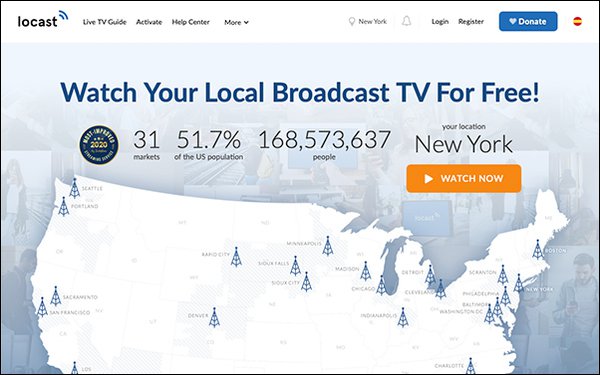Locast Loses Big Ruling In Battle With TV Broadcasters
- by Karlene Lukovitz @KLmarketdaily, September 1, 2021

Locast, a registered not-for-profit that captures over-the-air broadcast signals and streams them over the internet to users who live within a specific geographic areas, has been handed a major blow by a New York federal court ruling.
Judge Louis Stanton of the Southern District of New York essentially rejected Locast's core argument that it is exempt from copyright infringement liability, by denying Locast's request for summary judgment and granting the four opposing broadcasters' motion for partial summary judgment.
ABC, CBS, NBC Universal and Fox filed a copyright infringement lawsuit against Locast two years ago.
Locast contends that it complies with the U.S. Copyright Act, which allows some not-for-profit companies to re-transmit broadcast television signals to users without first reaching re-transmission agreements with station owners and networks.
But the broadcasters contend that the provision applies only to “localized transmissions” and
doesn't extend to Locast's "inherently global" internet transmissions.
The broadcasters also argue that the $5 monthly donations sought by Locast are actually “fees” for service, which disqualify the company from relying on the copyright exemption granted to nonprofits that boost signals.
“Following an introductory period, Locast interrupts a user’s television stream every 15 minutes on a given channel with an advertisement asking the user to pay $5 per month (which Locast labels a 'donation'),” the broadcasters wrote in a letter to the court in April. “If the user does not agree to pay the monthly charge, he or she is sent back to Locast’s program guide and must navigate back to the channel he or she was watching.”
Locast countered that more than half of its active users don't make donations.
However, Locast has acknowledged that, in addition to covering operational costs, some of the money it raises is used for expanding its operations to new markets. It now serves more than three dozen markets.
"Based on the undisputed facts, it is clear that the Locast service is not offered without charges other than those 'necessary to defray the actual and reasonable costs of maintaining and operating' its service," Stanton wrote in the order. "The payments defendants elicit from users are charges assessed on users to avoid constant service interruptions...[it] is not merely a recurring gift to a charitable cause."
"We are disappointed in the ruling today and disagree with its conclusions and reasoning," Locast's attorney, R. David Hosp, said in a statement. "Our client is in the process of evaluating the decision and formulating next steps. Locast provides a valuable service to its over 3 million users who are otherwise unable to access the over-the-air broadcasts to which they are entitled by virtue of their location or economic circumstances. Our client remains committed to its mission of delivering free, local broadcast TV service to all Americans, and particularly for those consumers who can’t afford pay-TV services like cable, satellite, or streaming, or who can’t get their local broadcast channels using an over-the-air antenna."


